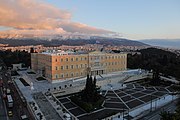


Greece is a parliamentary republic.The nominal head of state is the President of the Republic, who is elected by the Parliament for a five-year term.[24] The current Constitution was drawn up and adopted by the Fifth Revisionary Parliament of the Hellenes and entered into force in 1975 after the fall of the military junta of 1967–1974. It has been revised twice since, in 1986 and in 2001. The Constitution, which consists of 120 articles, provides for a separation of powers into executive, legislative, and judicial branches, and grants extensive specific guarantees (further reinforced in 2001) of civil liberties and social rights.[25] Women's suffrage was guaranteed with a 1952 Constitutional amendment.
According to the Constitution, executive power is exercised by the President of the Republic and the Government. From the Constitutional amendment of 1986 the President's duties were curtailed to a significant extent, and they are now largely ceremonial; most political power thus lies in the hands of the Prime Minister.[26] The position of Prime Minister, Greece's head of government, belongs to the current leader of the political party that can obtain a vote of confidence by the Parliament. The President of the Republic formally appoints the Prime Minister and, on his recommendation, appoints and dismisses the other members of the Cabinet.
Legislative power is exercised by a 300-member elective unicameral Parliament. Statutes passed by the Parliament are promulgated by the President of the Republic.Parliamentary elections are held every four years, but the President of the Republic is obliged to dissolve the Parliament earlier on the proposal of the Cabinet, in view of dealing with a national issue of exceptional importance. The President is also obliged to dissolve the Parliament earlier, if the opposition manages to pass a motion of no confidence.
The Judiciary is independent of the executive and the legislature and comprises three Supreme Courts: the Court of Cassation (Άρειος Πάγος), the Council of State (Συμβούλιο της Επικρατείας) and the Court of Auditors (Ελεγκτικό Συνέδριο). The Judiciary system is also composed of civil courts, which judge civil and penal cases and administrative courts, which judge disputes between the citizens and the Greek administrative authorities.
Political parties
Since the restoration of democracy, the Greek two-party system is dominated by the liberal-conservative New Democracy (ND) and the social-democratic Panhellenic Socialist Movement (PASOK).[27] Other significant parties include the Communist Party of Greece (KKE), the Coalition of the Radical Left (SYRIZA) and the Popular Orthodox Rally (LAOS). The current prime minister is George Papandreou, president of the PASOK and son of the late Andreas Papandreou, who on October 4, 2009, with a majority in the Parliament of 160 out of 300 seats.
Peripheries and prefectures
Administratively, Greece consists of thirteen peripheries subdivided into a total of fifty-one prefectures (nomoi, singular Greek: nomos). There is also one autonomous area, Mount Athos (Greek: Agio Oros, "Holy Mountain"), which borders the periphery of Central Macedonia.
Map  | Number  | Periphery  | Capital  | Area (km²)  | Area (sq mi)  | Population  |
|---|---|---|---|---|---|---|
 | ||||||
| 1 | Attica | Athens | 3,808 | 1,470 | 3,761,810 | |
| 2 | Central Greece | Lamia | 15,549 | 6,004 | 605,329 | |
| 3 | Central Macedonia | Thessaloniki | 18,811 | 7,263 | 1,871,952 | |
| 4 | Crete | Heraklion | 8,259 | 3,189 | 601,131 | |
| 5 | East Macedonia and Thrace | Komotini | 14,157 | 5,466 | 611,067 | |
| 6 | Epirus | Ioannina | 9,203 | 3,553 | 353,820 | |
| 7 | Ionian Islands | Corfu | 2,307 | 891 | 212,984 | |
| 8 | North Aegean | Mytilene | 3,836 | 1,481 | 206,121 | |
| 9 | Peloponnese | Kalamata | 15,490 | 5,981 | 638,942 | |
| 10 | South Aegean | Ermoupoli | 5,286 | 2,041 | 302,686 | |
| 11 | Thessaly | Larissa | 14,037 | 5,420 | 753,888 | |
| 12 | West Greece | Patras | 11,350 | 4,382 | 740,506 | |
| 13 | West Macedonia | Kozani | 9,451 | 3,649 | 301,522 | |
| - | Mount Athos (Autonomous) | Karyes | 390 | 151 | 2,262 |
Foreign relations
Greece is a member of the European Union since 1981,[9] a member of the Economic and Monetary Union of the European Union since 2001, NATO since 1952,[10] the OECD since 1961,[11] the WEU since 1995, a founding member of Black Sea Economic Cooperation and a member of ESA since 2005.
Prominent issues in Greek foreign policy include the enduring dispute over Cyprus, differences with Turkey over the Aegean sea, as well as the naming dispute with the Republic of Macedonia, which Greece refers to internationally by the provisional reference "the former Yugoslav Republic of Macedonia".

No comments:
Post a Comment